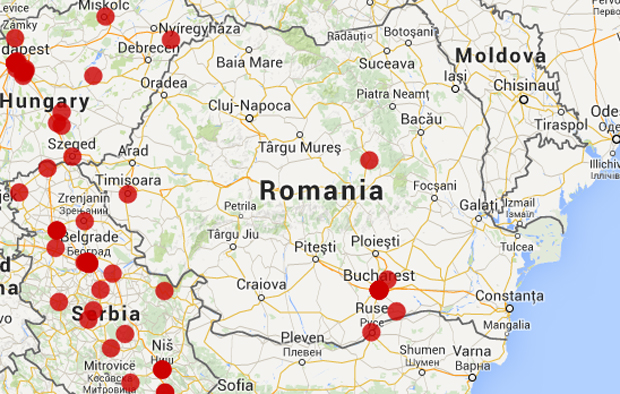21 Dec 2018 | Croatia, Hungary, Macedonia, Media Freedom, media freedom featured, Montenegro, News and features, Poland, Serbia
[vc_row][vc_column][vc_single_image image=”104453″ img_size=”full” add_caption=”yes”][vc_column_text]Additional reporting by Ada Borowicz, Ilcho Cvetanoski, Lazara Marinković and Zoltán Sipos
Unpatriotic behaviour. Sedition. Being in the pay of shadowy external forces. Faking a neo-Nazi event. These are just a few of the charges that have recently been levelled against independent journalists by pro-government media outlets in several central and eastern European countries.
The opening volley in a sustained campaign of vilification directed at Serbia‘s independent media was fired by the state-owned weekly Ilustrovana Politika at the end of October, with an article that accused journalists who are critical of the government of being “traitors and collaborators with the enemies of Serbia”.
Two weeks later, Ilustrovana Politika followed up with another piece that accused the veteran journalist Ljiljana Smajlović – who has long been critical of the nationalistic legacy bequeathed on the country by its former leader Slobodan Milosević and co-founded the Commission Investigating the Murders of Journalists in Serbia – of complicity in the 1999 NATO bombing of Belgrade.
In mid-December, Ilustrovana Politika’s campaign of character assassination against Smajlović ratcheted up another level with a garish front page depicting her as a Madonna figure with two naked infants bearing the features of Veran Matić, the chairman of the commission, and US Ambassador to Serbia Kyle Scott.
Smajlović has no doubt over what lies behind this tidal wave of denigration, of which she has become the prime target.
History repeating itself?
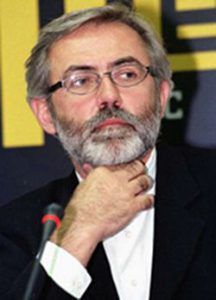
Editor Slavko Ćuruvija was murdered in 1999.
The long-running trial of four ex-members of the Serbian intelligence service accused of the murder of Dnevni Telegraf editor Slavko Ćuruvija – shot dead in April 1999 a few days after the pro-government Politika Ekspres accused him of welcoming the NATO bombardment – is now in its final stages, and Smajlović is convinced that the current campaign against her is designed to influence the judges in the case.
“The attacks come from the same Milosevic-era editors who also targeted my colleague Ćuruvija as a traitor prior to his assassination,” she told Mapping Media Freedom. “What is also sinister is that they are published and printed by the same state-owned media company that targeted Slavko nearly twenty years ago.”
“The clear implication is that I am the same kind of traitor as he was. How will that affect the judges? Will they fear this is not a good time to hold state security chiefs to account?” she added.
While Smajlović admits that Ilustrovana Politika’s denunciation has made her feel insecure, she insists she is less concerned for her own safety than worried about the consequences for the outcome of the Ćuruvija trial. Quoting Marx’s dictum that “History repeats itself, first as tragedy and then as farce”, Smajlović said. “I hope this is the farce part.”
Laying the blame
In Serbia and other central and eastern European countries, the assignment of responsibility for historic causes of resentment and the potential of these to further divide a polarised public often form the background to attacks on independent journalists by their state-approved colleagues.
The thorny topic of Poland’s relations with Germany during the last century recently gave pro-government media in Poland a chance to accuse independent media of being insufficiently patriotic and even of falsifying facts.

Journalist Bartosz Wieliński was targeted by the head of TVP Info’s news site.
In November, after Bartosz Wieliński, a journalist with the independent daily Gazeta Wyborcza, gave a critical account of a speech made by the Polish ambassador to Berlin at a conference devoted to the centenary of Poland’s independence, the head of the state broadcaster’s news website, TVP Info, accused him of lying and of putting the interests of Germany before those of his own country.
Only a few days before this attack, two media outlets that support Poland’s ruling national-conservative Law and Justice (PiS) party accused the independent US-owned channel TVN of fabricating the evidence on which a report about the resurgence of neo-Nazism in Poland was based.
Since it came to power in 2015, PiS – which has been accused by its critics of tolerating organisations that espouse far-right ideologies – has put pressure on independent media outlets, many of which are foreign-owned, as part of its campaign to “re-polonise” the media, and now appears to be using the public broadcaster and other tame outlets as accessories in this drive.
Willing accomplices
In Hungary, where the government led by Viktor Orbán has succeeded in imposing tight control on all but a few determinedly independent media outlets, a number of loyal publications are available for the purposes of vilification.
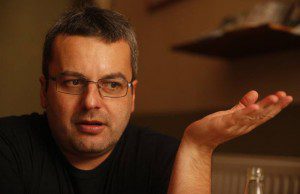
2015 Freedom of Expression Journalism Award winner Tamás Bodoky, founder of Atlatszo.hu
In September, a whole raft of pro-government media outlets vied with each other to depict Tamás Bodoky, the editor-in-chief of the investigative journalism platform Átlátszó and winner of the 2015 Index on Censorship Freedom of Expression Award for Journalism, as a “Soros hireling”. Bodoky became the target of a co-ordinated smear campaign after he posted on Facebook a picture of himself taken in Brussels with Dutch Green MEP Judith Sargentini, whose report on the Fidesz government’s infringement of core EU values had formed the basis for the European parliament’s censure motion against Hungary a few weeks earlier.
Another Hungarian journalist, András Dezső, who works for the independent news website Index.hu, also recently came under attack from pro-government media outlets after a Budapest court let him off with a reprimand over a case in which he was alleged to have made unauthorised use of personal information. In an article published before April’s general election, Dezső had cast doubt on the account of a woman who declared on Hungarian TV that she felt safer in Budapest than in Stockholm because of the lower level of immigration in Hungary. The airing of the interview by the public broadcaster was seen as providing support for Fidesz’s anti-immigration stance and aiding its election victory.
A criminal charge was issued against Dezső for “misuse of personal data”, and after he received what was described in the Hungarian media as “the mildest possible punishment”, two pro-government news websites, 888.hu and Origo.hu, accused him of deliberately propagating fake news and seeking to mislead his readers.
Why do they do it?
What motivates those journalists who smear their colleagues who seek to hold power to account?
There does not appear to be a simple answer to this question. While some may vilify fellow journalists to order purely for financial gain (or because of a desire for job security, government-sponsored media outlets generally being on a more secure financial footing than their independent counterparts), some appear to approach the task with at least a measure of conviction.
Ilcho Cvetanoski, who reports on Bosnia, Croatia, Macedonia and Montenegro for Mapping Media Freedom and has observed many smear campaigns over the years, believes that financial and ideological motivating factors are often inextricably intertwined. He points out that two decades on from the armed conflicts in the region, Balkans societies are still deeply divided along ideological and ethnic lines, and many people still find it extremely difficult to accept the right of others to see things differently. Cvetanoski notes that there are many “true believers” who are genuinely convinced that they have a duty to defend their country from the “other” – a group in which they tend to lump critical journalists along with mercenaries, spies and traitors.
Lazara Marinković, who covers Serbia for Mapping Media Freedom, believes that the main motivation there is a need to be on the winning side and to please those in power. “Often they actually enjoy doing it, either for ideological reasons or because they feel more powerful when they are on the side of the ruling party,” she told Mapping Media Freedom. Marinković noted that the majority of Serbian tabloids and TV stations that conduct smear campaigns against independent journalists are owned by businessmen who have close links to President Aleksandar Vučić’s national conservative Serbian Progressive Party (SNS). Vučić began his political career during the Milosević era, when he served as Minister of Information.
In Poland, the divisions in society and the consequent lack of tolerance in political culture have been blamed for the increasing polarisation of the media. Michal Głowacki, a professor of media studies at Warsaw University, told Mapping Media Freedom that journalists take their cue from politicians in failing to show respect for fellow journalists associated with the “other side”. “They even use the same language as politicians,” Głowacki notes.
This is a view echoed by Hungarian journalist Anita Kőműves, a colleague of Bodoky’s at Átlátszó. Kőműves, however, insists that while journalists who work for independent media outlets strive to uphold the principles of journalistic ethics, the same cannot be said of those employed by pro-government outlets. “Some of those serving the government at propaganda outlets think that the two ‘sides’ of the Hungarian media are equally biased and that they are not acting any differently from their counterparts in the independent media sphere. However, this is not true: pro-government propaganda outlets do not adhere to even the basic rules of journalism,” she told Mapping Media Freedom.[/vc_column_text][vc_raw_html]JTNDaWZyYW1lJTIwd2lkdGglM0QlMjI3MDAlMjIlMjBoZWlnaHQlM0QlMjI0MDAlMjIlMjBzcmMlM0QlMjJodHRwcyUzQSUyRiUyRm1hcHBpbmdtZWRpYWZyZWVkb20udXNoYWhpZGkuaW8lMkZ2aWV3cyUyRm1hcCUyMiUyMGZyYW1lYm9yZGVyJTNEJTIyMCUyMiUyMGFsbG93ZnVsbHNjcmVlbiUzRSUzQyUyRmlmcmFtZSUzRQ==[/vc_raw_html][vc_basic_grid post_type=”post” max_items=”4″ element_width=”6″ grid_id=”vc_gid:1545385969139-cb42990e-b3e2-3″ taxonomies=”9044″][/vc_column][/vc_row]
28 Aug 2015 | Mapping Media Freedom, mobile, News and features, Romania
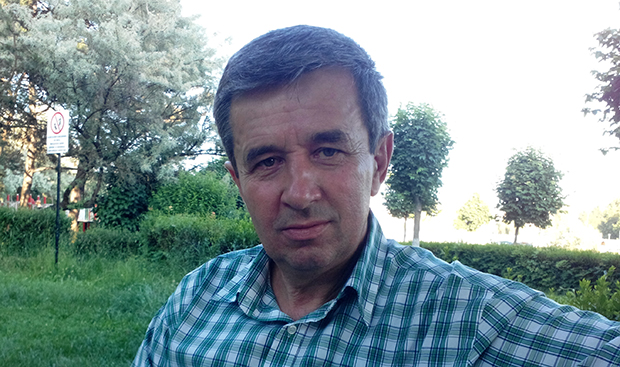
Vasile Luca (Photo: Zoltan Sipos)
Vasile Luca, a veteran journalist working at Radio Cluj, a Romanian public radio station based in Cluj-Napoca, was fired in May 2015 as a result of a disciplinary committee hearing.
Two months before his termination, Luca, who had been with the station for 25 years, went public with internal documents showing that a station employee, Debreczeni Hajnalka, who was also the press secretary for the head of a political party, was not actually completing any work despite an unusually high salary. Luca filed a complaint at the public prosecutor’s office and, after media coverage, Hajnalka resigned from the station. The station refused to disclose what Hajnalka’s job title had been.
At the time of the resignation, Hajnalka said her role had been to coordinate media strategies, internal communication between public stations and media monitoring. She denied that she had broken any laws or acted inappropriately.
“The case of Debreczeni Hajnalka was surely not the sole reason for my dismissal”, Luca told Index during an interview. “However, after the Debreczeni scandal, there was a lot of pressure, and multiple phone calls were made because the party she works for, the Democratic Union of Hungarians in Romania (DAHR), is very influential in the upper echelons of public radio”.
Luca had a long track record of conflicts with station management. He had previously documented illegalities and misuse of public funds at the radio station. In 2010, Luca was granted whistleblower status by Transparency International Romania after he gathered evidence that Florin Zaharescu, director of the station at the time, was embezzling funds.
Luca was subjected to his first disciplinary action in January 2015. Station management accused him of being the author of caricatures of the radio station’s directors. The images were found in the office he shared with six other journalists.
“When Ovidiu Miculescu, the general director of the Romanian Radio Broadcasting Company, was showing his solidarity with the murdered editors of Charlie Hebdo at the French Embassy, editor-in-chief at Radio Cluj, Bogdan Rosca, was trying to impose disciplinary actions against me for a couple of ironic quotes and some pictures of a bristly kitten”, the journalist said.
Along with the “bristly kitten”, the disciplinary committee also weighed a private letter the journalist had written to Vasile Dancu, a local politician and sociologist. In the letter, Luca criticised Dancu for supporting Rosca, his former student, calling him “incompetent”, “unprepared” and “resentful”.
The committee also considered a letter that Luca wrote to Miculescu that criticised Rosca’s managerial performance by citing research that showed that the radio station’s audience numbers plummeted after Rosca took over in February 2014.
As a result of the hearing, Luca’s salary was cut by 10 per cent for one month.
Immediately after the first disciplinary hearing, the editor-in-chief filed a complaint against Luca accusing him of collaborating with a privately-owned television station while he was on sick leave.
“My work ended well before I took a couple of months of sick leave. Even the disciplinary committee had to admit that I had management’s approval for a one-year collaboration with Argo TV which began in April 2013”, Luca said.
Months after the series of documentaries were shot and aired, the television station uploaded the documentary onto their website. The web publication date coincided with the period Luca was on leave. He also appeared on an Argo TV talk show during his leave.
“Luca had an appearance on television as an editor he could not account for”, Attila Szász, the head of the disciplinary committee told Index. “We did not recommend he be dismissed. The dismissal was the decision of the general director”.
According to Luca, the hearing of the disciplinary committee was unlawful because he was not granted the right to be represented by a lawyer. In a written request sent to the committee just before the hearing, Luca pointed out that the exact time and place of the hearing was not set and when they finally made the decision, his lawyer was unable to be present.
Luca said he did not receive copies of the medical records used as evidence against him and, he believes, that the process did not meet standards required by Romanian labour law. As a whistleblower, Luca said, there are legal requirements for transparency that were not met. For example, the time and location of the hearings were supposed to be publicised three days in advance and members of the press should have been granted access.
He has filed a legal complaint and a judge will decide whether he has grounds to challenge the disciplinary actions.
Mapping Media Freedom
Click on the bubbles to view reports or double-click to zoom in on specific regions. The full site can be accessed at https://mappingmediafreedom.org/
|
Related:
• Romania: Whistleblowing journalist fired by public radio station (28 May 2015)
• Romania: 52 reports since May 2014
This article was published at indexoncensorship.org on 28/8/2015
28 Oct 2014 | Digital Freedom, European Union, Hungary, Mapping Media Freedom, News and features
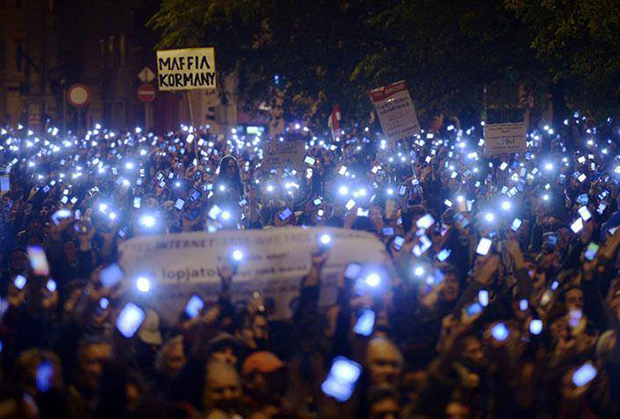
Hungarians gathered in Budapest on Sunday to protest plans to introduce a tax on internet bandwidth. (Photo: 100,000 Against the Internet Tax /Facebook)
Barring a u-turn from the Hungarian government, demonstrators will return to the streets of Budapest this afternoon to oppose Prime Minster Viktor Orban’s plans to tax the internet
The draft law proposed by Orban’s government would levy a fee of 150 forints (£0.40; €0.50; $0.60) per gigabyte of data traffic. In the face of public outrage, ruling party Fidesz promised that the tax will be capped at 700 forints for consumers and 5,000 forints for businesses. However, this did not calm the angry protesters.
Sunday’s rally that drew thousands of people to the Hungarian captial’s city center. The peaceful protest became heated when some demonstrators marched to the Fidesz headquarters, and broke the windows of the building with old computers and peripherals.
This protest was arguably the largest anti-government demonstration since 2010, when Viktor Orban came to power. In contrast with other protests, the gatherings denouncing the internet tax were not organized by the weak, discredited and fragmented opposition.
According to the Hungarian media, the new tax was Viktor Orban’s own brainchild. He did not consult with his staff or the members of his government. The prime minister plans to use the money to raise the salaries of policemen and other employees of the interior ministry.
According to official estimates, the new tax will bring into the budget about 20 billion forints annually. While the Hungarian government is saying that the companies will pay the new tax, consumers fear that in the end the costs will be pushed onto their bills. The Association of IT, Telecommunications and Electronics Companies has already said the tax would force them to raise prices.
The protests are likely to continue because Hungarians realise this is more than just another tax. Many fear that the new tax will restrict access to information, put another burden on already impoverished small businesses and act as a curb on freedom of expression. It will also be a leash on young people who mainly use online media and who tend to be critical towards the government.
“The move… follows a wave of alarming anti-democratic measures by Orban that is pushing Hungary even further adrift from Europe,” the organisers of the Facebook group 100,000 against the internet tax said in a press release. “The measure would impede equal access to the internet, deepening the digital divide between Hungary’s lower economic groups and limiting internet access for cash-poor schools and universities,” they added. The group has drawn more than 200,000 likes.
Moreover, many people believe the plan of the tax is just a way to direct the public’s attention away from the US visa ban scandal. Recently Washington banned six Hungarian state officials from entering the United States, because of their alleged involvement in high-level corruption.
This is an unprecedented step towards a country that is member of the EU and NATO, and signals a low point between the relations of Hungary and the United States.
The tax didn’t go unnoticed in Brussels either. Neelie Kroes, vice president of the European Commission responsible for the Digital Agenda for Europe tweeted that it was “a shame for users and a shame for the Hungarian government”. Her spokesperson, Ryan Heath also criticized the tax in harsh terms during an EU Commission press briefing.
The internet tax is just another in a series of “special taxes” the Orban government introduced in the last couple of years to be able to keep the budget deficit in check. Retail, banking and energy sectors, as well as telecommunications providers are required to pay extra taxes. At the same time, the Hungarian government lowered the personal income taxes and subsidises the price of electricity and water.
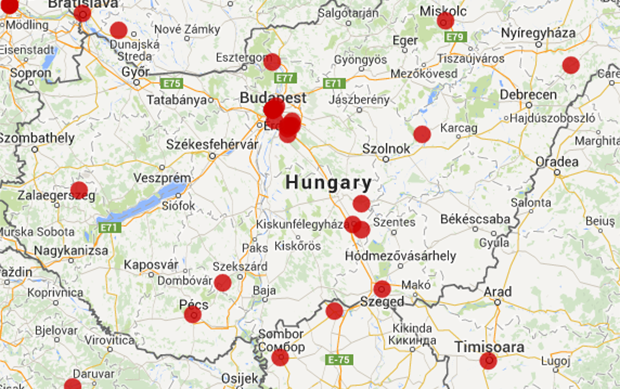
Community radio application rejected
Deputy prime minister labels investigative journalists “traitors”
Police raided the offices of NGOs, seized documents
See all media violation reports from Hungary
This article was posted on 28 October 2014 at indexoncensorship.org
8 Oct 2014 | Mapping Media Freedom, News and features, Politics and Society, Romania
In November, Romanians are set to head to the polls to elect a new president from a field of 14 candidates during two rounds of polling. But one important participant, the National Audiovisual Council of Romania (CNA), will be sidelined as it loses its legally mandated quorum.
According to the CNA’s website, its role is to “ensure that Romania’s TV and radio stations operate in an environment of free speech, responsibility and competitiveness.”
While the first round of voting is set to get underway on 2 November, the CNA’s quorum of eight will be halved on 4 November when four members of the council step down at the end of their terms. If no candidate wins a majority in the first poll, the top candidates will compete in a second round on 16 Nov.
“Without a quorum, the CNA cannot function, and thus it cannot sanction the eventual abuses of television or radio stations during the election campaign,” said Narcisa Iorga, a CNA board member. Iorga believes politicians will benefit from this, as it is in their best interests to have an inactive CNA. Television stations will also use the situation in their favor, though they are already accustomed to breaking the audiovisual legislation, she added.
According to some members of the council, it could be January before the CNA regains its quorum and the ability to make decisions on issuing sanctions, well after the election campaign and the two rounds of voting.
The CNA is Romania’s only regulatory body overseeing television and radio programmes. In its watchdog role, the regulator ensures that legislation governing programming is respected. It’s a key role in a country where television is the dominant media among the population. Political parties and interest groups use the country’s live television shows to get their message across to the public.
By law, the CNA is supposed to have 11 board members. To maintain a quorum, eight members need to be present at the proceedings. The members, who have a mandate of six years, are nominated by the senate (three members), the chamber of deputies (three), the president (two), the government (three), and are confirmed by the parliament.
This is where politics comes into play: the parliament, controlled by a coalition led by the party of Victor Ponta, the prime minister who is the best-placed candidate at the presidential elections, did not vote to confirm the new members before the parliamentary vacation began. Therefore in less than a month, the CNA will have only seven members, one member short of the quorum.
Not having enough members to be able to take decisions is nothing new for the regulatory body. When there are politically sensitive issues on the table, some of its members usually go on a vacation.
For example, on 9 October a number of complaints against the Antena 3 news television will be debated, but it is more than likely that will be no quorum. Two CNA members are currently on vacation, and another two just announced their absence, wrote Iorga on her Facebook wall.
Media violation reports from mediafreedom.ushahidi.com
Penal code change could ensnare journalists
Falun Gong practitioner detained during interview
Journalists denied access to government building
Director of public television receives “warnings”
Jurnalul National editor assaulted and threatened
This article was published on 8 Oct 2014 at indexoncensorship.org







